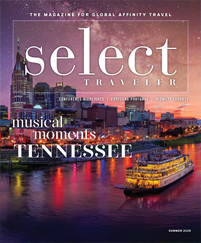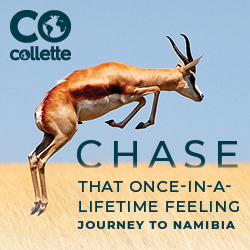Remember when you were able to go to the airport ticket counter and obtain all the boarding passes for your travelers? And, don’t forget that once upon a time, you were able to take charge of the check-on baggage while club members simply enjoyed their time.
Some of you may even recall when bank members would be told to meet at the departing gate a few minutes before takeoff.
Oh, those were the days.
Christopher Elliott is a syndicated newspaper columnist, National Geographic Traveler columnist and MSNBC.com commentator who specializes in travel troubleshooting and often acts as a traveler’s advocate. He is also sympathetic toward bank travel leaders in this completely different day and age.
“Group travel has certainly become more difficult post 9/11 and even more so since the underwear bomber — the alleged terrorist who tried to detonate his explosive underwear on a Christmas Day flight to Detroit,” said Elliott. “The airport experience is not group friendly, and one might say there is even a bias against groups. The deck is stacked against you if you’re traveling by air, and group leaders definitely need to adapt a new skill set.
“If you’re leading a group, you should be the expert,” he said.
Elliott emphasized that a major key to a successful trip is preparing group members for what they will experience in an airport. “Tell them, ‘This is what happens when you get screened, and this is what you take in your carry-on, and this is what you take in your checked luggage.’”
Communicate the drill
Brian Jewell, associate editor of Bank Travel Management, agreed. This frequent flyer, who sometimes travels with bank groups, logs an average of 60,000 air miles every year and has been a visitor to six continents, said, “You have to have people prepared ahead of time. On the final meeting before your flight, give your members a blow-by-blow description of what will happen through security, because there are older folks who may be startled or even offended by what happens.
“You’re going to have to take off your shoes, your belt, and there may be items inside your body, like an artificial knee, that sets off bells. You may be patted down — privacy isn’t what it used to be.
“Tell people what they need to have with them and not in their check-on luggage — your driver’s license, a passport if you’re traveling internationally and enough medication for your flight. Any liquids, gels or aerosols need to be 3.4 ounces or less, and they all have to fit in a one-quart zip bag. All other liquids can go in checked baggage.
“This may be second nature to those of us who travel frequently but often not to bank members. I always see people who have to throw away products when going through security.”
The airport experience
The atmosphere for a director trying to lead 40 people through an airport is often chaotic. Unlike those good old days when group members remained together for the long journey from the airport lobby to the departure gate, there are numerous opportunities to become separated along the way.
“Group members are directed to go through different security lines,” said Elliott. “They are sent through at various speeds. Some may even be pulled aside for a random check. In large, unfamiliar airports or in an international airport where English may not be the first language, a group leader has to have a plan. Once again, the best plan is preparation with group members and, certainly, patience.
“Prepare for the worst, and assume everyone is going to be patted down. If none of that happens, great,” he said.
Elliott recently experienced a whole-body imager, the new security device designed to capture detailed images of individuals to look for threats that typical metal detectors can’t find.
“The screener showed me what I looked like. While I found the image rather humorous, that certainly isn’t everyone’s response. There are only a smattering of these machines in operation, but expect to see more,” he said.
As of December, 40 of these machines were installed in 19 airports and 30 more machines have been ordered, according to the Transportation Security Administration (TSA) Web site. The site also states, “Advanced imaging technology does not store, print, transmit or save the image. All machines have zero storage capability, and all images are automatically deleted from the systems after they are reviewed by the remotely located security officer.”
War stories
Immediately after the December 2009 incident involving the underwear bomber, the TSA reacted with a directive that forbade international travelers bound for the United States to have a pillow, blanket or laptop computer on their lap for the final hour of flight, along with a variety of other rules.
“That original directive has changed,” said Elliott. “It is now up to the discretion of the flight crew, but groups can expect more rigorous rules if they are returning from certain locations.”
Jewell can attest to those more rigorous security rituals when traveling internationally. His personal experiences have made for comic, water cooler conversations, but even this seasoned traveler admits his nerves were on edge on more than one occasion during the events.
Jewell was briefly detained in Jordan because of Slim Jims in his back pack — the beef jerky treat was evidently unfamiliar and suspicious looking to the security agent. He was asked to drop his trousers in Tel Aviv because his belt buckle set off an alarm.
“For sure, when you are traveling internationally, all bets are off,” he said. “When I was going through customs in Detroit after an exhausting flight from Amsterdam, the agent looked at my form and then at me and was obviously doubtful about this disheveled guy who had just spent five days in this city known for some unsavory souvenirs.
“After thorough questioning, he got in my face and said, ‘I don’t care what you did in Amsterdam, but I do care about what you’re bringing back into this country.’ He searched all my luggage, and luckily, I had lots of time to make my connection.”
Elliott claims his personal travel experiences have mostly been “boring and routine.”
“The most excitement I get is traveling with my three young children, who sometimes don’t feel in the mood to take direction,” he said. “Bank directors can take some joy in knowing that the only thing worse than trying to keep a group together in an airport is traveling with your own family.”









